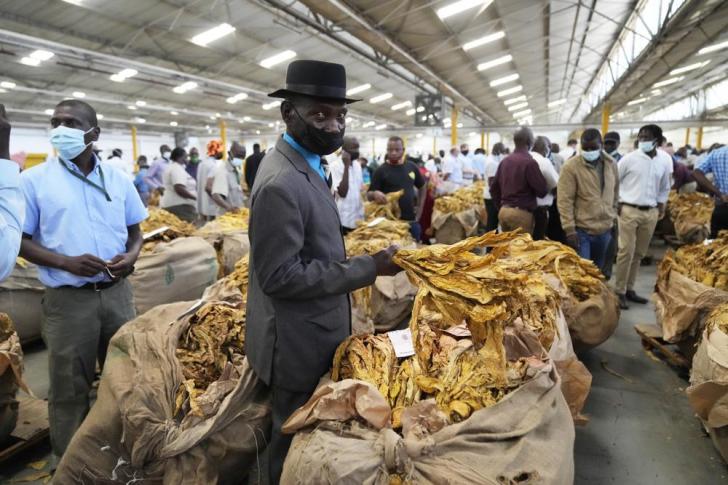News / Local
Extended tobacco stalk destruction date expires
4 hrs ago | Views

The grace period granted to tobacco farmers to clear their fields of tobacco stalks and roots ended on June 5, and the Government has now intensified monitoring efforts to enforce compliance, with defaulters facing fines and other penalties aimed at protecting Zimbabwe's vital tobacco industry.
Dr. Dumisani Kutywayo, Chief Director of the Department of Research and Specialist Services (DR&SS), confirmed that the Plant Quarantine Services Institute (PQSI) together with the Agricultural and Rural Development Advisory Services (ARDAS) are actively overseeing the removal of tobacco stalks.
"In the event of non-compliance, fines will be imposed as per regulations," Dr. Kutywayo said.
Last month, Lands, Agriculture, Fisheries, Water and Rural Development Minister Dr. Anxious Masuka announced an extension for the 2024/25 tobacco season, allowing growers additional time—from May 15 to June 5—to clear late-planted crops affected by a delayed season start.
He underscored the penalties for violating stalk destruction regulations:
"For a first offence, a fine of up to US$100 per hectare or part thereof, or imprisonment up to one year, or both, may be imposed. Repeat offences carry heavier penalties—up to US$200 per hectare or part thereof, or imprisonment up to two years, or both."
Growers unable to meet the June 5 deadline were urged to formally apply for an extension by addressing the chief director responsible for the National Plant Protection Organisation of Zimbabwe prior to the cutoff date.
The Plant Pests and Diseases (Tobacco) Regulations, governed by Statutory Instrument 711 of 1979 (as amended), were established to reduce the spread of pests and viral diseases transmitted by insect vectors such as aphids, whiteflies, and thrips. These viruses, including tobacco bushy top virus (TBTV), tobacco streak virus (TSV), and tobacco leaf curl virus (TLCV), can severely damage tobacco crops and reduce leaf quality.
Because many of these viruses have wide host ranges, removing tobacco stalks deprives insect vectors of their food source and disrupts their life cycle, thus preventing the spread of disease from one season to another.
Tobacco remains a cornerstone of Zimbabwe's agriculture, supporting approximately 160,000 households and accounting for over 50 percent of agricultural exports. It contributes between 14 and 20 percent of the agricultural sector's gross domestic product (GDP).
Recent data from the Zimbabwe National Statistics Agency (ZimStats) shows tobacco export earnings increased from US$1.297 billion in 2023 to US$1.427 billion in 2024, underscoring the crop's importance to the national economy.
To maintain access to lucrative international markets, tobacco stakeholders are urged to strictly observe phytosanitary regulations. Infested tobacco products are unmarketable, making adherence to pest control measures critical for safeguarding the country's export reputation and the industry's sustainability.
The Government's renewed efforts to enforce stalk destruction mark a vital step in preserving Zimbabwe's tobacco industry against pests and diseases that threaten both crop quality and economic stability.
Dr. Dumisani Kutywayo, Chief Director of the Department of Research and Specialist Services (DR&SS), confirmed that the Plant Quarantine Services Institute (PQSI) together with the Agricultural and Rural Development Advisory Services (ARDAS) are actively overseeing the removal of tobacco stalks.
"In the event of non-compliance, fines will be imposed as per regulations," Dr. Kutywayo said.
Last month, Lands, Agriculture, Fisheries, Water and Rural Development Minister Dr. Anxious Masuka announced an extension for the 2024/25 tobacco season, allowing growers additional time—from May 15 to June 5—to clear late-planted crops affected by a delayed season start.
He underscored the penalties for violating stalk destruction regulations:
"For a first offence, a fine of up to US$100 per hectare or part thereof, or imprisonment up to one year, or both, may be imposed. Repeat offences carry heavier penalties—up to US$200 per hectare or part thereof, or imprisonment up to two years, or both."
The Plant Pests and Diseases (Tobacco) Regulations, governed by Statutory Instrument 711 of 1979 (as amended), were established to reduce the spread of pests and viral diseases transmitted by insect vectors such as aphids, whiteflies, and thrips. These viruses, including tobacco bushy top virus (TBTV), tobacco streak virus (TSV), and tobacco leaf curl virus (TLCV), can severely damage tobacco crops and reduce leaf quality.
Because many of these viruses have wide host ranges, removing tobacco stalks deprives insect vectors of their food source and disrupts their life cycle, thus preventing the spread of disease from one season to another.
Tobacco remains a cornerstone of Zimbabwe's agriculture, supporting approximately 160,000 households and accounting for over 50 percent of agricultural exports. It contributes between 14 and 20 percent of the agricultural sector's gross domestic product (GDP).
Recent data from the Zimbabwe National Statistics Agency (ZimStats) shows tobacco export earnings increased from US$1.297 billion in 2023 to US$1.427 billion in 2024, underscoring the crop's importance to the national economy.
To maintain access to lucrative international markets, tobacco stakeholders are urged to strictly observe phytosanitary regulations. Infested tobacco products are unmarketable, making adherence to pest control measures critical for safeguarding the country's export reputation and the industry's sustainability.
The Government's renewed efforts to enforce stalk destruction mark a vital step in preserving Zimbabwe's tobacco industry against pests and diseases that threaten both crop quality and economic stability.
Source - The Herald






























